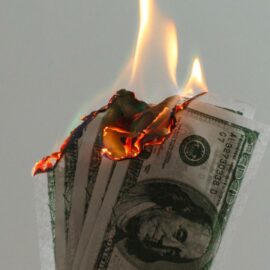
This is a free excerpt from one of Shortform’s Articles. We give you all the important information you need to know about current events and more.
Don't miss out on the whole story. Sign up for a free trial here .
Why is there going to be an oil price increase? What effect will this have on you and the economy overall?
OPEC+, the Organization of Petroleum Exporting Countries, recently announced plans to cut global oil production. With this announcement comes concerns about oil price increases and how this will impact gas prices for consumers as well as the U.S. economy overall.
Keep reading to learn about the impending oil price increase, including possible energy solutions we should consider.
The Impending Oil Price Increase
Oil production cuts by OPEC+ slated to begin in November will likely lead to crude oil price increases, with economic and political consequences in the U.S. and around the world.
In this article, we’ll explain what you should know about OPEC+’s move: Why are they trying to raise oil prices? What effect will this have on gas prices and the overall economy?
Background: Who Is OPEC+?
OPEC is the Organization of Petroleum Exporting Countries. It currently includes Algeria, Angola, Congo, Equatorial Guinea, Gabon, Iran, Iraq, Kuwait, Libya, Nigeria, Saudi Arabia, the United Arab Emirates, and Venezuela. Its mission is to maximize profit to its member countries from oil exports by coordinating oil production and policies.
In 2016, OPEC signed a cooperation agreement with 10 additional oil-producing countries: Azerbaijan, Bahrain, Brunei, Kazakhstan, Malaysia, Mexico, Oman, Russia, North Sudan, and South Sudan. “OPEC Plus” or “OPEC+” is an informal name used to describe the coordinated efforts of OPEC and these additional cooperating countries.
Why Is OPEC+ Trying to Increase Oil Prices?
To maximize its members’ profits, OPEC+ generally tries to keep the price of oil as high as possible without making it so high as to trigger economic recession (which would erode demand).
Currently, oil prices remain relatively high in Western markets, but have decreased over the past three months due to the slowing economic recovery (and thus, slowing demand). OPEC+ is reducing production to compensate for the reduction in demand and drive prices back up.
Keeping oil prices high is particularly important for Russia (which is one of the prominent members of OPEC+) because sanctions have obliged Russia to sell its oil at discounted rates to the remaining countries that are willing to buy it. The more they have to discount their oil, the higher the base price needs to be for them to make a profit.
Western nations have imposed sanctions on trade with Russia in response to Russia’s invasion of Ukraine, to reduce Russia’s ability to finance the war.
Will This Cause Gas Prices to Rise?
Assuming that OPEC+’s planned reduction in crude oil production by two million barrels a day succeeds in increasing the price of crude oil, gas prices will also increase. This is because gasoline is made by refining crude oil, so the price of gas is basically the price of the oil plus the cost of refining it, plus the cost of transporting it from the refinery to the gas station, plus taxes and any other fees involved in selling gasoline. Changes in the price of gas are driven mostly by changes in the price of oil, because the other costs don’t usually change much over time.
However, experts note that two factors may reduce the effect of increasing oil prices on gas prices, at least in certain parts of the U.S.:
- First, a number of US refineries have been shut down or running at reduced capacity for repairs lately. A reduction in the supply of refining capacity has driven up the cost of refining, increasing gas prices, especially in certain areas. As these refineries come back online, the cost of refining will come back down, reducing the price of gas and counteracting the increase due to rising oil prices. Experts expect this effect to be most pronounced in California, Washington, and the Midwest, based on the location of the affected refineries.
- Second, OPEC+’s actual production cuts may be smaller than the nominal figure because actual production in OPEC+ countries has been lagging below target production. While they reduced target production by two million barrels per day, the new target is only about 600,000 below current production. If the supply of oil doesn’t decrease as much, prices won’t increase as much.
What Effect Will This Have on the Economy?
Some analysts are concerned that OPEC+’s move to drive oil prices back up could push the world economy into recession. Economic growth and recovery from the pandemic-era stagnation have slowed in recent months, and increasing energy costs could exacerbate this trend.
Should We Embrace Nuclear Energy, Instead?
Considering OPEC+’s plan to decrease production and the subsequent crude oil price increase, should the U.S. turn its attention towards other sources of energy? Nuclear energy is getting renewed attention worldwide as a potential answer to two pressing problems: energy supply disruption by Russia and worsening climate change from fossil fuels, like oil and coal. But it remains an especially divisive topic in the United States.
Supporters of nuclear energy argue that it’s our best chance—and perhaps our only chance—to meet our energy needs while staving off the worst effects of climate change. Nuclear power produces a tiny fraction of the greenhouse gases that fossil fuels do, so increasing our reliance on nuclear energy (thereby reducing our reliance on fossil fuels) will have enormous environmental benefits.
Renewable energy sources such as solar, wind, and hydroelectric power are still a long way from being reliable and sustainable enough to power the U.S. The main problem is that their fuel sources—wind and sun—are intermittent, while a nuclear plant can run 24 hours a day. For example, the US Office of Nuclear Energy estimates that it would take four 1-gigawatt solar plants to equal the output of a single 1-gigawatt nuclear plant.
So, even if we went all-in on these green energy sources, we’d have to supplement them with other energy sources like natural gas and coal. That means we’d still be pumping large amounts of greenhouse gases into the atmosphere.
Finally, advocates of nuclear energy address the possibility of another Chernobyl-level disaster by arguing that, even if that extremely unlikely worst-case scenario happens, it’s still preferable to the damage that climate change will cause.
Where Do We Go From Here?
Where the U.S. goes from here is a complicated question, and it’s the subject of a great deal of debate. In 2018, nuclear power provided about a quarter of all clean energy worldwide—it was outperformed only by hydroelectric power, which provided about half.
However, the use of nuclear power is declining, even as energy consumption continues to rise. Nuclear proponents say that we must redouble our investments into nuclear power, while opponents say that we should phase it out in favor of renewables like wind, solar, and hydropower. With OPEC+ making headlines for increasing oil prices, this debate could see renewed discussion.
However, there is a third option: Some experts say that a comprehensive energy strategy must include both nuclear power and renewables, and suggest temporarily relying on nuclear power to both meet our needs and protect the environment while we continue to advance renewable technology. Then, once non-nuclear energy sources can reliably meet our energy needs, we would phase out nuclear in favor of those safer options.

Want to fast-track your learning? With Shortform, you’ll gain insights you won't find anywhere else .
Here's what you’ll get when you sign up for Shortform :
- Complicated ideas explained in simple and concise ways
- Smart analysis that connects what you’re reading to other key concepts
- Writing with zero fluff because we know how important your time is






